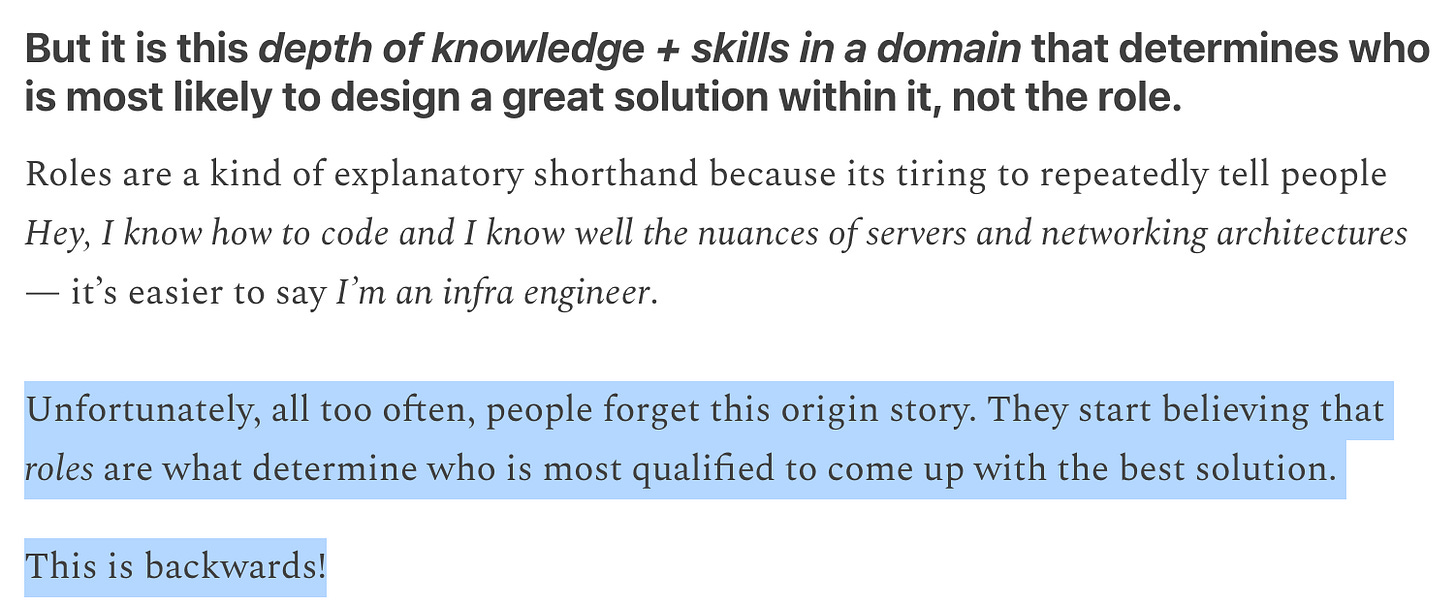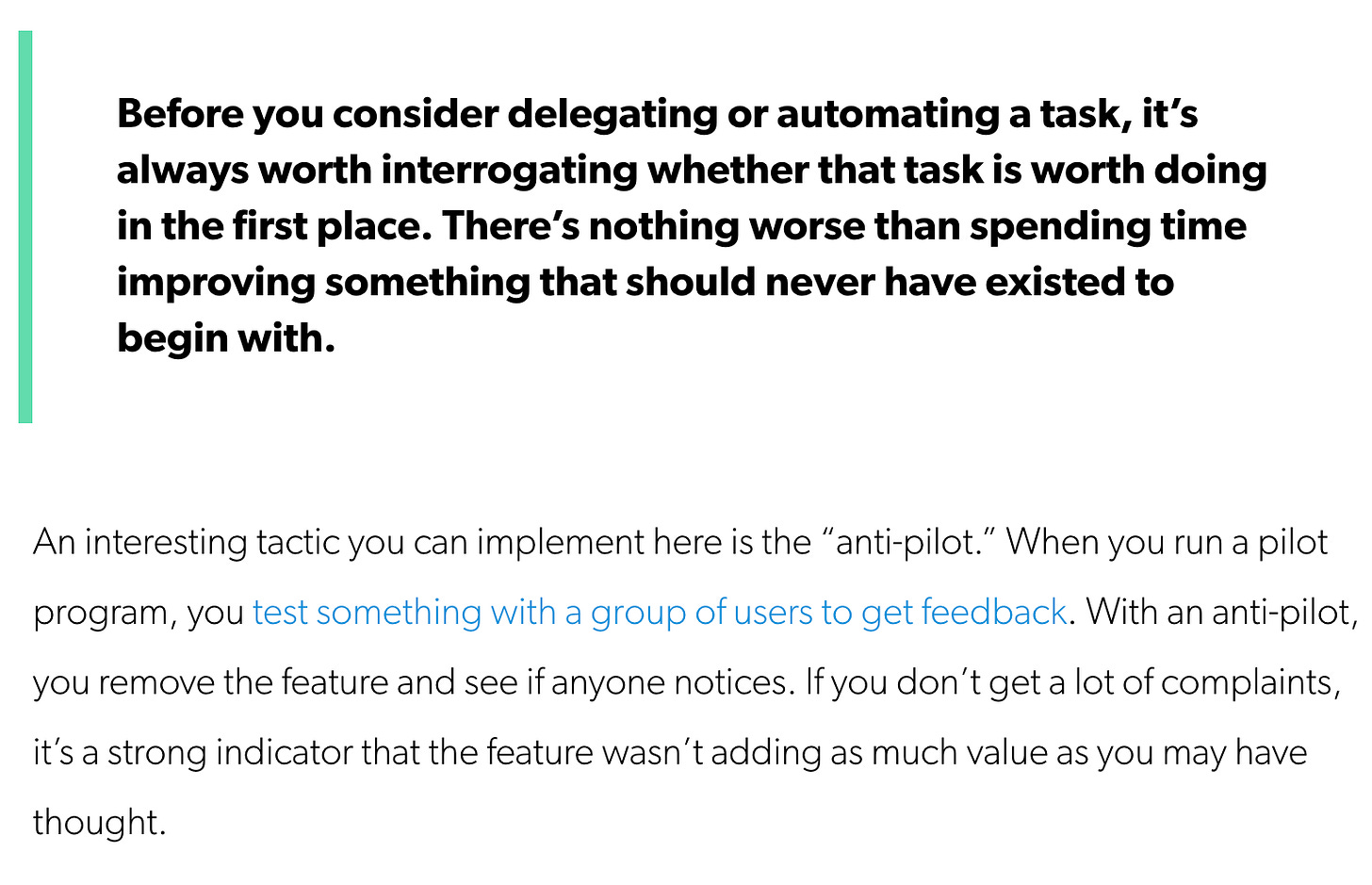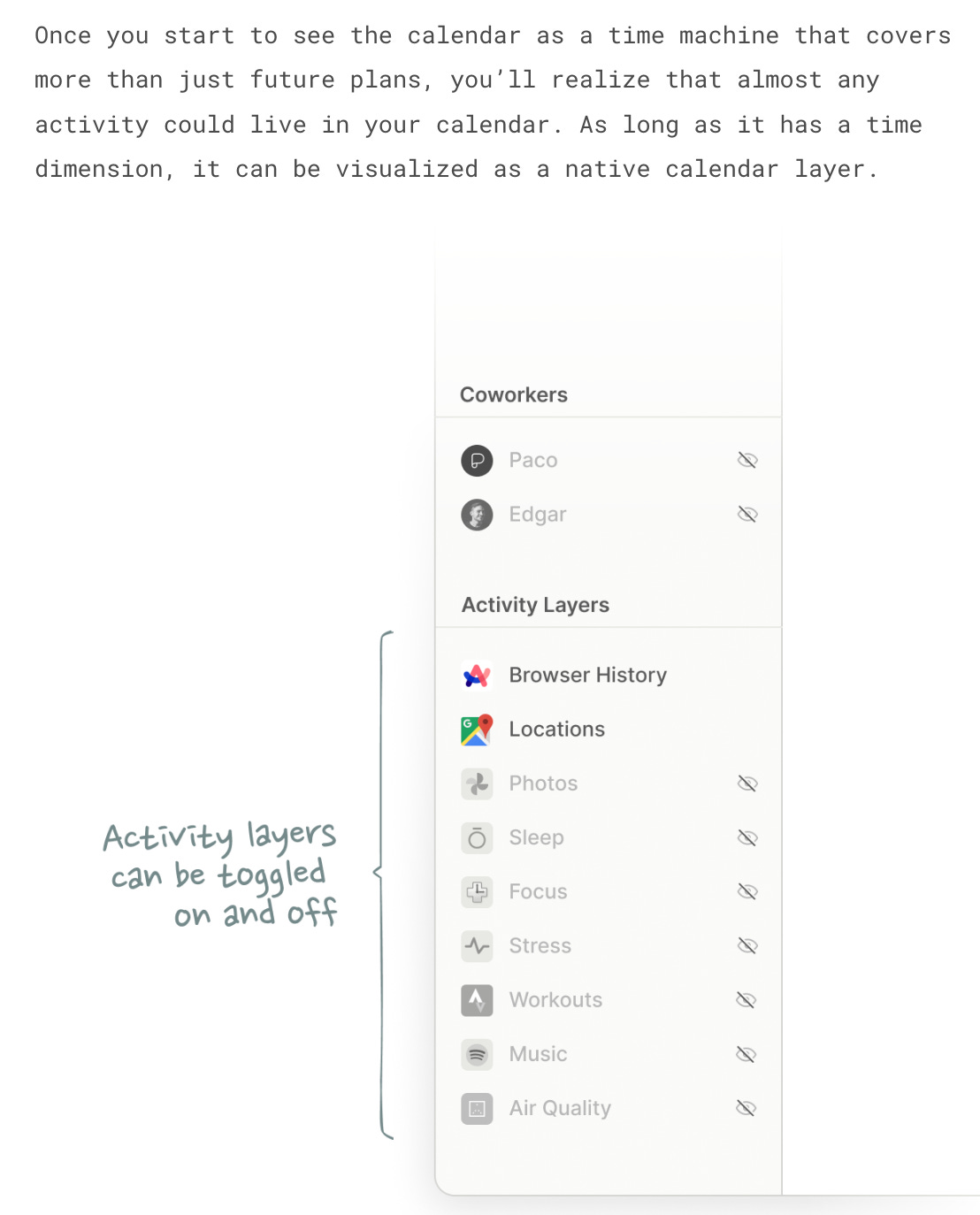📓 Higher level design, Multi-layered calendar, Better delegation and beautiful world of Storytelling.
Ideas from Julie Zhuo, Sam Corcos, Julian Lehr & More
Hi and welcome to the post #120.
I’ve made minor changes in today’s format. Let me know if this helped you in any ways.
It was a crazy week at work. I am glad, I could somehow take some time out to explore new ideas (and refresh my mind). It worked wonders. I am super excited about what I’ve to share here. I hope you will like them too!
Here is today’s lineup:
⛰️ Higher level design
📆 How to delegate better
🗓️ Multi-layered calendars
🪄 Storytelling for leaders
❓ A research paper unlike others
🐘 Stories of Crow, Elephant & Yahoo boys
And much more…
Let’s get started.
1. Higher Level Design
Julie Zhuo’s “Higher Level Design” is meant as a commentary (or an execution model) for Brian Chesky’s famous “we got rid of all pms” talk recently. But this post is not topical at all.
Her core argument is around the meaning of design and how it can expand to actually solutioning for something you’ve deep passion & understanding of.
A couple of snippets from the post that are worth noting down.
1. What is design?
2. Challenges in current understanding of our ‘roles’ in the team
It’s a brilliant piece, taking the understanding of design a notch above what we generally understand. I highly recommend this one!
2. How to delegate better
Sam Corcos’s ideas on productivity & work culture are some of the most radical I’ve read. I had briefly covered his post around how he spent his first two years of company-building for Levels in the post #32.
Today, I cover his ideas on “How to make delegation your superpower”. He has written this post as a tactical guide to working with EAs better. That may not be very interesting (or seemingly relevant) for most of us. But I loved this post for the details he has poured into describing this model. Those details can work very well for any delegation setup and are potentially good solutions for key challenges that most of us face.
I loved the concept of ‘anti-pilot’. Here’s a snippet describing an ‘anti-pilot’ and how it helps improve your routine workflows.
3. Multi-layered Calendars
If you’re someone who thinks of time & productivity, then Julian’s “Multi-layered calendars” offers some great food for thought. I must warn, this is not any lecture on productivity hacks. It’s a way of thinking about your productivity stack with the calendar playing a more important role than what it does.
A couple of key takeaways from the post:
Treating todos as calendar events is helpful because calendars introduce constraints.
We only use our calendars to look forward in time, never to reflect on things that happened in the past. That feels like a missed opportunity.
Finally, the snippet below offers the crux of what a multi-layered calendar could be. Julian’s arguments are compelling and worth a notice.
4. Storytelling for leaders
First Round Review’s “Good Leaders are great storytellers” packs a bunch of useful lessons on storytelling. It’s a curation of 6 different ideas from the stalwarts in the startup world. From Netflix to Pixar, the references are compelling and ideas worth noting. See which one suits your style & stage of project.
I found the concept of ‘bar test’ very interesting. This is from folks at IDEO. A snippet below for your reference.
5. Things could be better
In post #118, I had covered “The rise and fall of peer review” by Adam Mastroianni. It’s a fascinating piece challenging the ‘peer review’ model of (publishing) academic research.
The article talked of an academic study that Adam & Ethan Ludwin-Peery had conducted and published online - “Things could be better”. This article, according to Adam, did not suffer from the challenges that he identified with the ‘peer reviewed’ articles. And it was talking about a specific instance of valid and verifiable academic research - albeit to make it more useful for everyone.
The paper has a fun style to it and makes it easy to read. It was highly enjoyable for an academic paper. Here’s the 2 cent version as captured in the abstract.
Overall, it seems, human imagination has a bias: when people imagine how things could be, they imagine how things could be better.
6. Beautiful world of storytelling
Some essays and long reads to make you feel the joy of great storytelling. Long reads, bookmark them for your leisure time reads.
The Crows of Karachi by Rafia Zakaria
A few years ago, a reader wrote a letter to the editor at Dawn, the English newspaper where I am a columnist, saying that if you want to estimate the filth and neglect of a city, count the crows. One study did, and found the letter writer’s words to be entirely true: when humans do not attend to waste and carrion, the crows nourish on it, multiplying with feral glee.
The Romance Scammer on My Sofa by Carlos Barragan
By traveling thousands of miles, I’d encountered young men who donned masks to manipulate people and get what they wanted from the world. I’d also recognized that my mom had a mask of her own—she often wore it with me and my brothers, to protect us as much as herself. And she’d cast it off for a stranger, a choice that was perhaps never mine to understand.
Sanctuary by Shannon McCaffrey
There are many kinds of love stories. This one involves a woman and an elephant, and the bond between them spanning nearly 50 years. It involves devotion and betrayal. It also raises difficult questions about the relationship between humans and animals, about control and freedom, about what it means to own another living thing.
7. Everything else
Some random goodness from the internet:
Alt text - hall of fame (of sorts). Captioning your images doesn’t only help blind people. It can help people understand the context for the image, explain a pop-culture meme, provide a placeholder for a missing image, or image loading over a slow internet connection.
If you’re looking for some book recommendations, Derek Sivers’ “Books I’ve read” page has a great list to offer. It has a quick summary & link to Derek’s booknotes for the books that he has listed.
@culturaltutor on the story behind Les Espaces d'Abraxas and why it holds a significant place in tales of modern urbanization.
That's all for this week, folks!
I hope I've earned the privilege of your time.
Please leave a comment or send a message with your feedback. It’s highly helpful & encouraging. If that’s too much of an effort (or not required), at least hit the ❤️ at the start or end of the post to show your love.






